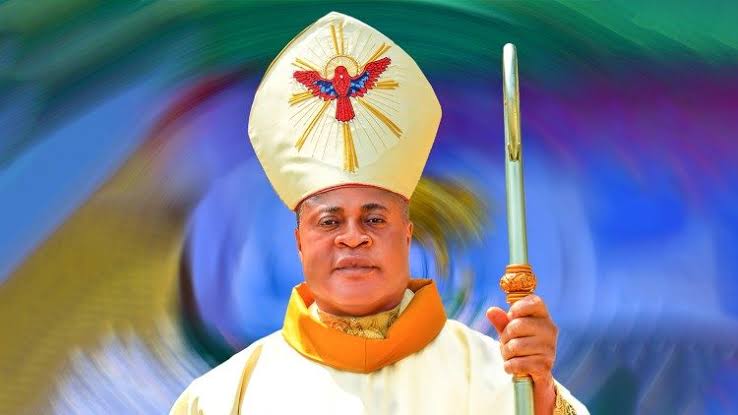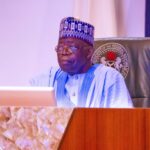Following Pope Francis’s death on Monday, Cardinals (senior members of the Catholic Church’s clergy) will gather at the Conclave (a College of Cardinals gathering) to elect a new Pope.
The election of a new Pope begins between 15 and 20 days after the passing of the Pope.
Nigeria’s Cardinal Peter Okpaleke has qualified to be one of the College of Cardinals who will determine the emergence of Pope Francis’s successor.
The Catholic Broadcast Commission of Nigeria announced Cardinal Peter’s selection on Tuesday, stating why he is the country’s qualified choice.
According to the Commission of Nigeria, only one of the four Cardinals in Nigeria is eligible to vote and be elected to the Papal Conclave.
The rule states that cardinals above 80 are disqualified from participating.
Nigeria presently has four Cardinals: Francis Cardinal Arinze (92), Anthony Cardinal Okogie (88), John Cardinal Onaiyekan (81) and Peter Cardinal Okpaleke (62).
By this, only His Eminence, Cardinal Okpaleke, will participate in the Conclave.
Who is Cardinal Peter Okpaleke?
Born on 1 March 1963, in Amesi, Anambra State, Nigeria, he attended local schools. In 1983 he entered the Bigard Memorial Major Seminary in Ikot-Ekpene and Enugu, where he studied philosophy and theology from 1983 to 1992.
He also studied Canon Law in Rome at the Pontifical University of the Holy Cross and was ordained a priest of the Diocese of Awka on 22 August 1990.
A cardinal of the Catholic Church, he has been Bishop of Ekwulobia, Anambra State, since 29 April 2020.
Although Cardinal Okpaleke rarely makes the news, as he leads a private life, he was caught in protests when he was first appointed Bishop of Ahiara in 2012 and consecrated in 2013.
In July 2017, PREMIUM TIMES reported how about 3000 Catholic priests joined by worshippers to protest his appointment, insisting on an Mbaise bishop instead.
They argued that Ahiara is in Mbaise, a predominantly Catholic region of Imo State and that Bishop Okpaleke was brought from neighbouring Anambra State.
In reaction to their opposition, Pope Francis gave the defiant priests a 30-day ultimatum to write a letter apologising, promising obedience to authority and accepting the bishop appointed for their diocese.
On 19 February 2018, Okpaleke resigned as Bishop of Ahiara.
On 5 March 2020, just over two years after accepting his resignation as Bishop of Ahiara, Pope Francis appointed him as the Bishop of the Diocese of Ekwulobia, a newly created diocese in Anambra State.
He was elevated to cardinal by Pope Francis on 27 August 2022.
For curious minds about his personal life, as is the rule in Roman Catholicism, priests do not marry or bear children. So this answers the question about his wife and children.
The priestly vow of celibacy
In the Roman Catholic Church, priests of the Latin Rite are required to remain celibate.
This means they are not permitted to marry and are expected to abstain from sexual activity.
While celibacy is a requirement for priests in the Latin Rite, it is not universal across all Catholic rites.
The Church teaches that celibacy allows priests to devote themselves more fully to their ministry and the service of the Church.
A priest who breaks his vow of celibacy may face serious consequences, including suspension from ministry and even excommunication.
Nigeria’s close call
As explained by the Catholic Broadcast Commission of Nigeria, the Church excuses Cardinals above 80 from voting out of concern for the Cardinals themselves.
“Selecting the Supreme Pontiff can be a significant burden of responsibility, and especially so when one is advanced in age. These Cardinals instead support the electors by helping to lead the People of God in prayer during the election,” the body states.
This rules out Cardinal Okogie, the Lagos Catholic Archdiocese’s Archbishop emeritus, whom Pope John Paul declared a cardinal on 21 October 2003, and he is considered the most influential of the Nigerian Cardinals.
He holds the title of Cardinal Priest of Santa Maria del Monte Carmelo a Mostacciano (Blessed Virgin Mary of Mt. Carmel of Mostacciano).
Cardinal Okogie was one of the cardinal electors who participated in the 2005 papal conclave that selected Pope Benedict XVI.
He was also one of the cardinal electors in the 2013 papal conclave, which elected Pope Francis.
READ ALSO: Argentina cancel games after death of Pope Francis
Other Africans
In addition to Cardinal Okpaleke, other Africans tipped with a chance of becoming the next Pope are Ghanaian Cardinal Peter Kodwo Appiah Turkson, 76, Democratic Republic of Congo’s Cardinal Fridolin Ambongo Besungu, 65, the archbishop of Kinshasa, and Ivory Coast’s Cardinal Ignace Bessi Dogbo, 63.
‘Ingravescentem aetatem’
In 1970, Pope Paul VI limited the electors to cardinals under 80 in Ingravescentem aetatem (Advancing Age).
In 2013, when Pope Benedict XVI announced his plan to resign as pope, he described his reasoning as Ingravescentem aetatem.
Pope Benedict XVI slightly amended the procedures Pope John Paul II established in Universi Dominici Gregis in 2007 and 2013.
With this, a two-thirds supermajority vote is required to elect the new pope.
The most recent papal conclave occurred in 2013, when Jorge Mario Bergoglio was elected Pope Francis, succeeding the retiring Pope Benedict XVI.
Support PREMIUM TIMES’ journalism of integrity and credibility
At Premium Times, we firmly believe in the importance of high-quality journalism. Recognizing that not everyone can afford costly news subscriptions, we are dedicated to delivering meticulously researched, fact-checked news that remains freely accessible to all.
Whether you turn to Premium Times for daily updates, in-depth investigations into pressing national issues, or entertaining trending stories, we value your readership.
It’s essential to acknowledge that news production incurs expenses, and we take pride in never placing our stories behind a prohibitive paywall.
Would you consider supporting us with a modest contribution on a monthly basis to help maintain our commitment to free, accessible news?
TEXT AD: Call Willie – +2348098788999




